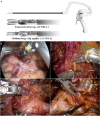Short-term outcomes and cost-effectiveness of laparoscopic gastrectomy with articulating instruments for gastric cancer compared with the robotic approach
- PMID: 37291374
- PMCID: PMC10250398
- DOI: 10.1038/s41598-023-36601-7
Short-term outcomes and cost-effectiveness of laparoscopic gastrectomy with articulating instruments for gastric cancer compared with the robotic approach
Abstract
To overcome the limitations of laparoscopic surgery, robotic systems have been commonly used in the era of minimally invasive surgery despite their high cost. However, the articulation of instruments can be achieved without a robotic system at lower cost using articulating laparoscopic instruments (ALIs). Between May 2021 and May 2022, perioperative outcomes following laparoscopic gastrectomy using ALIs versus robotic gastrectomy were compared. A total of 88 patients underwent laparoscopic gastrectomy using ALIs, while 96 underwent robotic gastrectomy. Baseline characteristics were similar between the groups except for a higher proportion of patients with a medical history in the ALI group (p = 0.013). Clinicopathologic and perioperative outcomes were not significantly different between the groups. However, the operation time was significantly shorter in the ALI group (p = 0.026). No deaths occurred in either group. In conclusion, laparoscopic gastrectomy using ALIs was associated with comparable perioperative surgical outcomes and a shorter operation time compared to robotic gastrectomy in this prospective cohort study.
© 2023. The Author(s).
Conflict of interest statement
The authors declare no competing interests.
Figures


References
Publication types
MeSH terms
LinkOut - more resources
Full Text Sources
Medical

